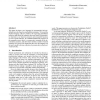Free Online Productivity Tools
i2Speak
i2Symbol
i2OCR
iTex2Img
iWeb2Print
iWeb2Shot
i2Type
iPdf2Split
iPdf2Merge
i2Bopomofo
i2Arabic
i2Style
i2Image
i2PDF
iLatex2Rtf
Sci2ools
130
click to vote
ESOP
2016
Springer
2016
Springer
Probabilistic NetKAT
This paper develops a new language for programming softwaredefined networks based on a probabilistic semantics. We extend the NetKAT language with new primitives for expressing probabilistic behaviors and enrich the semantics from one based on deterministic functions to one based on measures and measurable functions on sets of packet histories. We establish fundamental properties of the semantics, prove that it is a conservative extension of the deterministic semantics, and show that it satisfies a number of natural equations. We present case studies that show how the language can be used to model a diverse collection of scenarios drawn from realworld networks.
| Added | 03 Apr 2016 |
| Updated | 03 Apr 2016 |
| Type | Journal |
| Year | 2016 |
| Where | ESOP |
| Authors | Nate Foster, Dexter Kozen, Konstantinos Mamouras, Mark Reitblatt, Alexandra Silva 0001 |
Comments (0)

